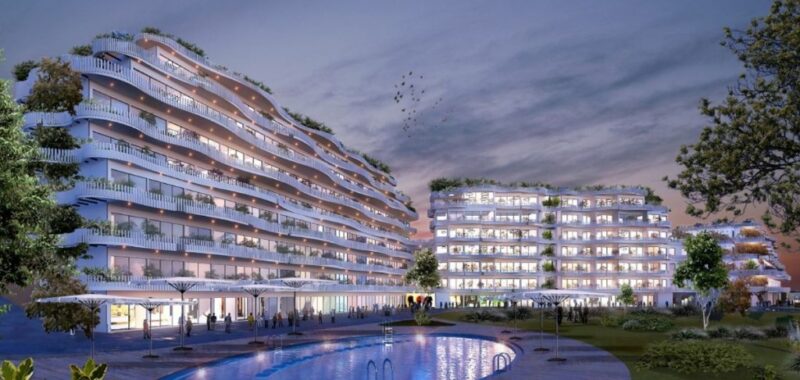Africa’s hotel development has reached unprecedented levels as hotel groups such as Marriott, Hilton, and Radisson race to plant their brand flags in the continent’s fastest-growing markets, especially Egypt and Morocco.
In the works are 577 hotel projects, totaling about 105,000 rooms. That marks a 13.3% increase from last year, according to a report from W Hospitality Group, a Nigeria-based advisory firm. That’s a record pipeline, the consultancy said.
“Africa has a lot of untapped resources, beauty, wildlife, and the potential is incredible,” Carlos Khneisser, vice president of development for Hilton in the Middle East and Africa, told Skift.
Egypt as the Largest Market
North Africa had a 23% year-on-year jump in projects.
Egypt remains the continent’s largest market with 143 hotels in development, following a record 15.7 million tourists in 2024 that surpassed pre-pandemic levels.
Egypt’s tourism minister recently described the country as “extremely challenged” by hotel room shortages.
Hilton, Marriott International, and Radisson are all leaning into a dual approach in Egypt, balancing resort development along the Red Sea with a renewed focus on Greater Cairoâs urban market.
Khneisser said Hilton is rolling out lifestyle and all-inclusive concepts in both segments to meet shifting demand. It has already opened 14 hotels and has 40 more in the pipeline.
Radisson follows a similar model, investing in mixed-use and resort assets.
Marriott, which already operates 18 hotels in Egypt, with another 24 in the pipeline, is also doubling down.
âWeâre well distributed, both from city hotels and resorts,â said Jerome Briet, chief development officer for EMEA [Europe, Middle East, and Africa] at Marriott. The Red Sea and North Coast have seen significant activity, while downtown Cairo’s redevelopment includes projects like the Autograph Collection in Tahrir Square.
âCairo remains a key hub for us,â Briet said. âItâs a very well-balanced market, probably one of the most developed economies in Africa.â
Morocco’s Pre-FIFA Boom
Morocco tells a similar story. In 2024, 17.4 million tourists visited Morocco, a 20% rise year-over-year. The tourism sector now contributes over 7% of GDP.
Hilton now averages five to six signings a year there, including Waldorf Astoria Rabat Salé and Canopy by Hilton Tangier Bay. Marriott is expanding its Moxy and Autograph Collection brands, with a pipeline of 10 upcoming hotels.
“Today, we [Radisson] have almost 15 hotels, and we’re seeking to double our presence by 2030,” said Ramsay Rankoussi, vice president of development for Africa & Turkiye at Radisson.
Morocco will also co-host the 2030 FIFA World Cup alongside Spain and Portugal.
“An event like the FIFA World Cup is also one of those events that can transform the country’s tourism future and really boost the visibility of Morocco on an international scale,” said Briet.
Sub-Saharan Africa: Growth with Caution
Sub-Saharan Africaâs hotel development pipeline has reached over 55,000 rooms across 347 projects in 2025, a 6% increase from 2024.
While this pace lags behind North Africaâs boom, West Africa is attracting interest, with Nigeria, Ghana, and Senegal drawing interest from international brands.
âWe see good momentum in West Africa, like Senegal, Ghana, Angola, and we recently signed a Hilton in Niger,â Khneisser said.
Marriott is expanding its presence in Nigeriaâs fast-growing cities, positioning its Protea brand as a midscale solution for local travelers.
Briet noted that the country is developing an internal tourism market. âFor us to grab that market, we need to ensure that our brands are locally relevant,â he said. “We see growth, for example, with our Protea brand, which is inherently African design.”
Radisson Hotel Group continues to widen its footprint across the subcontinent with a focus on market diversity.
Rankoussi said the group now operates in over 30 African countries, with recent expansions into Guinea and Tanzania. He said the company aims to enter at least one new market each year.
The companyâs development strategy focuses on secondary cities with strong business travel, where it can enter quickly through conversions.
Infrastructure, currency risk, and political stability remain uneven across the region, forcing brands to be selective. But where the fundamentals align, hotel groups say the returns can justify the risk.
“Itâs about finding the right partners and being able to move when conditions are right,” said Rankoussi.
Financing and Delivery Constraints
Even in strong markets, turning plans into operating hotels remains difficult. Egypt opened just 3 of 12 scheduled hotels in 2024, Morocco opened 10 of 20, and 59 new chain hotels opened across Africa last year.
Hotel developers in certain African markets face capital costs of up to 25%, said Rankoussi. Such high costs mean projects need much higher returns in revenue to justify upfront investment than is typically needed in Europe. So, executives must carefully assess project viability and abandon those unlikely to deliver sufficient returns.
âSometimes the issues are regulatory, which is a little bit harder for us to support… But sometimes it’s a financial issue. Sometimes it’s just a sourcing issue [for development and construction], depending on the country and where the materials come from,â Briet said.
Progress is improving somewhat, with 38% of Africaâs signed projects now in construction, up from 21% a year ago. However, that still trails pre-pandemic levels.
âWest Africa is a great example,â Khneisser said. âWe are seeing new governments are willing to work with new investors … because they believe hotels, travel, and tourism are a force for good.â


